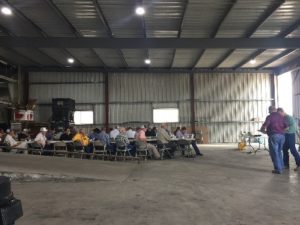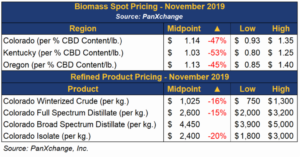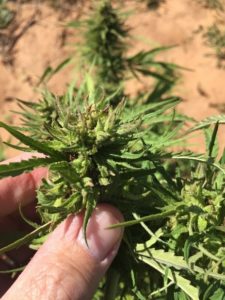Dr. Calvin Trostle, Extension Agronomy, TAMU Soil & Crop Sciences, Lubbock, TX
(806) 723-8432, ctrostle@ag.tamu.edu
December 5, 2019
This is a summary of recent hemp information relevant to Texas in view of 2020 production. As noted in last month’s hemp Row Crops Newsletter update, USDA released final interim rules which Texas Department of Agriculture will use to develop proposed Texas rules. The overall USDA hemp program information is found at https://www.farmers.gov/manage/hemp then through several links there.
These federal rules are currently in a 60-day public comment period. After reading the rules the public may offer comment. You can learn how to do this via the information at https://agrilife.org/texasaglaw/2019/10/29/usda-interim-final-hemp-rule-summary/
All public comment must be received at USDA by December 30, 2019.
Observations from November Texas A&M AgriLife Hemp Mini Workshops
I conducted short workshops in Hidalgo and Atascosa Counties on November 19 & 20 in addition to other programs in Kleberg Co. These were my first programs in more humid areas of the state. I was struck by how difficult it may be to get effective drying of hemp for CBD in any area of Texas where rainfall and humidity is high. I have become accustomed to seeing crops in New Mexico and Colorado where some field drying can occur in the semi-arid environment. That may not be possible in humid areas of Texas. Hemp biomass will likely need to go to indoor drying facilities shortly after harvest. For larger operators in time, there could be the equipment to aid drying with ambient air. Leaving crops in the field without timely drying could lead to mold issues which will degrade quality and price for CBD.
The disease and insect complex will remain unknown until industrial hemp is planted across Texas. For humid areas of Texas, and certainly in Gulf Coast regions, I anticipate powdery mildew may be an issue for hemp. AgriLife Extension plant pathologist Dr. Tom Isakeit, College Station (979.8462.1340, t-isakeit@tamu.edu) has compiled a preliminary summary of potential diseases hemp. He does not mention powdery mildew but based on other crops I think it could be an issue, especially if it gets into the floral structures. Cotton root rot is Dr. Isakeit’s primary concern as we anticipate that hemp may be at least moderately susceptible.
Current Spot Prices for Hemp CBD Have Fallen Precipitously
I have not yet regularly followed hemp CBD prices but will going forward. One popular online platform listing monthly spot market prices for dried flower for CBD is http://www.panxchange.com In January the Colorado price for CBD was $2.75 per each 1% of CBD per pound of dried flower. That price rose to $3.85 in May, and was still $3.48 in August, but is now $1.14 for the mid-point price received (down 47% from just last month; down 70% since the beginning of the cropping season. I don’t know the market trends that might be related to seasonal availability or proximity to planting and harvest of hemp in the U.S. But these numbers further emphasize the basis for over-the-top enthusiasm about grossing multiple tens of thousands of dollars per acre is gone. I will be interested to learn if market demand for CBD is still increasing, if the apparent bottleneck in CBD extraction is affecting prices, and what projections of 2020 acreage and supply may have on the forthcoming Texas market. Other states will be adding or expanding hemp in 2020 besides Texas.
There are many ways to contract industrial hemp
Last month I outlined that there are many ways to grow hemp. This month I note there are many ways to contract with a buyer/processor. First, if you will consider a loan (if you can get one—if you are ‘strapped for cash’ please consider walking away from hemp possibilities) or apply for Whole Farm Revenue Protection crop insurance in 2020, you will need to show proof of a license and a finalized buyer contract.
Also, regarding contracts, Texas A&M AgriLife strongly recommends that you have your own attorney review any contract agreement to grow hemp. These contracts will be much more detailed than growing sunflower for the commodity market or even contracts to supply fruits and vegetables to the fresh market. Your own attorney will help you avoid pitfalls and potential traps that could put you at a disadvantage.
Contract arrangements between a hemp grower and contractor/buyer/processor can be wide ranging. For some would-be growers, especially for a few acres or less, you can anticipate you will likely pay all expenses yourself. This has the highest risk to you as a grower.
In contrast, another type contract at the other end of the spectrum is where you the grower receive a flat fee ($1,000 per acre?) to grow, manage, harvest, dry the crop. You do not own the crop, and the contractor/buyer pays you for all expenses and fees. This has less risk, including the burden you would otherwise face if you got poor quality hemp seed (poor germination, low establishment, lack of seedling vigor) leading to a poor stand. You would not need crop insurance. (The buyer would but then he or she does not have five years of required farm income history.) What some would-be growers might be uncomfortable with or unwilling to accept about this latter arrangement is there is no opportunity for you to participate in any possible high revenues and potentially high profits. Would you be OK with that? Would you be satisfied to take the low-risk approach? There are many mid-range scenarios for growers/buyer contracts, including the grower might receive a small portion of the gross revenues.
Ongoing Texas A&M AgriLife Extension Hemp Resources
The agency website for hemp is at http://agrilifeextension.tamu.edu/hemp Trostle’s most recent comprehensive “First Things” hemp PowerPoint is AgriLife’s most detailed document to date. You can access it from a temporary website at http://lubbock.tamu.edu/hemp until it is loaded on the main website.
Upcoming Texas A&M AgriLife Extension Hemp Programs
• December 10, Cat Spring, Austin & Fayette County region. Cat Spring Ag Society Hall, 13035 Hall Road, Cat Spring (on the county line between the two counties). Registration at 1:00 PM, program begins at 1:30 PM, adjourns at 3:30 PM. Speakers Dr. Calvin Trostle, extension agronomist, and Dr. George Knapek, ag. economist, will be available for up to an additional hour to answer questions. For further information call or e-mail the Fayette Co. AgriLife Extension office, (979) 968-5861, sawilley@ag.tamu.edu $10(?) registration payable at the door.
• December 10, Wharton region. Wharton Civic Center, 1924 North Fulton Street, Wharton. Registration at 6:00 PM, program begins at 6:30 PM, adjourns at 8:30 PM. Speakers Dr. Calvin Trostle, extension agronomist, and Dr. George Knapek, ag. economist. Trostle will be available for up to an additional hour to answer questions. For further information call or e-mail RSVP to (979) 532-3310 by 5:00 PM Dec. 9, cbowen@ag.tamu.edu $10 registration payable at the door.
• December 11, 2019 Ag Summit—State of Southeast Texas Agriculture. 3 NRG Part, Houston, Texas. Trostle is the keynote luncheon speaker and will be available the rest of the afternoon through 2:30 PM to further visit about hemp. Program is 9:00 AM-2:30 PM. Contact Harris Co. AgriLife Extension, (713) 274-0950, shannon.dietz@ag.tamu.edu
• December 19, Texas A&M AgriLife Research & Extension Center, 1102 East Drew Street (FM 1294). Registration at 1:00 PM, program 1:30-4:00 PM. Speakers include Dr. Calvin Trostle, extension agronomist, and Dr. Justin Benavidez, ag. economist, and Lubbock Co. Extension agent staff. Pre-register at (806) 778-1740 (brady.arthur@ag.tamu.edu)
• January 13 (tentative), Texas A&M AgriLife Research & Extension Center, 6500 Amarillo Blvd. West, Amarillo. Trostle, Benavidez, Dowell-Lashmet. Details forthcoming from Potter Co. Extension agent Megan Eikner, (806) 373-0713, megan.eikner@ag.tamu.edu
• January 14 (details being finalized), Blacklands Income & Growth (B.I.G.) Conference, Waco Convention Center. Afternoon program. Forthcoming details from Bell Co. Extension, (254) 933-5305, lyle.zoeller@ag.tamu.edu
• January 15 (details being finalized), Comanche, Comanche Co. region. Forthcoming details from Comanche Co. Extension, (325) 356-2539, mwberry@ag.tamu.edu
Other AgriLife Hemp Programs in Discussion
• January 14 & 15, additional Central and East Texas locations (discussing among College Station, Commerce, and Overton)
• February 5, Dimmitt, Texas
• February 5, Dumas, Texas


